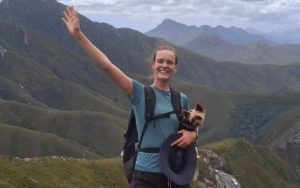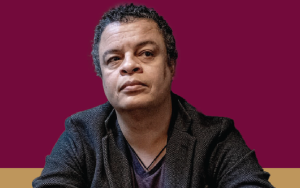
Dr Zara Trafford received a prestigious Wellcome Early-Career Award.
SU researcher receives R12m grant for disability studies
- Dr Zara Trafford received a prestigious Wellcome Early-Career Award.
- To date, she is the only SU recipient of this specific grant.
- Her project focuses on disabled young people in low-resource communities.
Dr Zara Trafford, a scholar in disability studies at the Institute for Life Course Health Research in the Faculty of Medicine and Health Sciences at Stellenbosch University (SU), recently received a prestigious R12 million Wellcome Early-Career Award. To date, she is the only SU recipient of this kind of Wellcome grant, which funds health research by and the career development of an emerging researcher for a five-year period.
The award will allow Trafford to lead a project exploring aspects of life that are often overlooked in research on disabled young people in low-resource communities, including joy, pleasure, belonging, meaning, and fulfilment. A key objective of the project is to develop and expand on contemporary conceptual frameworks for child and youth wellbeing, such as subjective wellbeing and occupational justice, by incorporating specific insights from this population in the South African context.
“Children and young people with intellectual and developmental disabilities are consistently excluded from opportunities for socialisation, play, recreation, and the chance to engage in activities that bring them pleasure and joy. They are often absent from or deprioritised in discussions about how human connection, relationships, communication, and a sense of purpose help prevent ill health and support mental well-being, particularly during adolescence and early adulthood,” says Trafford.
“This exclusion, which negatively affects identity formation, access, and participation throughout the life course, is in direct contravention of our country’s Constitution, as well as African Union and United Nations guidelines.”
Over the next five years, Trafford will collaborate with various civil society and service organisations, focusing on activities that support social interaction and stimulation for young people with intellectual or developmental disabilities. These organisations include a surfing coaching team in a rural Western Cape town for people with a range of disabilities, and a dance group collaboration between a local theatre and a school for deaf and hearing-impaired youths.
She will also work closely with a Lived Experience Advisory Panel of young people with intellectual and developmental disabilities to shape the research agenda from design to dissemination, as the project was designed in a way that is flexible enough to accommodate significant input from these co-researchers.
Trafford says the award will give her the opportunity to gain a deeper understanding of what these initiatives mean to the young people who participate in them, and what motivates the organisers to run such programmes.
“I’m especially interested in the role of social connectedness and occupation (i.e., the activities that engage individuals and add value to their daily lives, including relationships and participation) and how these support mental health and quality of life.”
Trafford says that the award will allow her a few years to focus on developing an intellectual project, rather than having to balance research with regularly seeking out new funding opportunities. She extends grateful thanks for the institutional support from the co-directors of her research unit, Profs Mark Tomlinson and Sarah Skeen (Institute for Life Course Health Research), and to her former doctoral supervisor Prof Leslie Swartz of the Department of Psychology for his extensive mentoring and guidance.
“Because the Early-Career Award includes provision for the upskilling of the principal investigator, I will also undertake training in various communication methods including augmentative and alternative communication and South African Sign Language.
“I will learn how to ‘translate’ documents into the ‘Easy-to-Read’ format, which improves the legibility of written documents for people with cognitive impairment or low literacy levels. All of the outputs from this project will also be adapted to this format. This upskilling will provide me with the tools I need to start a long-term career in participatory research with young people who communicate without or beyond speech.”
Alongside dissemination through publications, Trafford plans to build lasting relationships across academic, policy, programmatic and service sectors, and to recruit and train a postdoctoral research assistant. With guidance from the Lived Experience Advisory Panel, she will adapt her findings into a set of copyright-free children’s books and will collaborate with disabled co-researcher teams in Uganda and Kenya.
Trafford hopes to contribute to communicating the subjective preferences and needs of young people with intellectual and developmental disabilities in South Africa. Through this project, she aims to affirm their rights and capabilities and to highlight the work of individuals and organisations committed to expanding their horizons.



